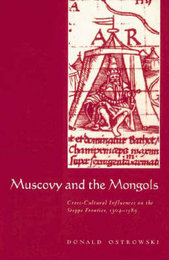
|
Muscovy and the Mongols: Cross-Cultural Influences on the Steppe Frontier, 1304-1589
Paperback / softback
Main Details
| Title |
Muscovy and the Mongols: Cross-Cultural Influences on the Steppe Frontier, 1304-1589
|
| Authors and Contributors |
By (author) Donald Ostrowski
|
| Physical Properties |
| Format:Paperback / softback | | Pages:348 | | Dimensions(mm): Height 229,Width 152 |
|
| Category/Genre | World history - c 500 to C 1500
World history - c 1500 to c 1750 |
|---|
| ISBN/Barcode |
9780521894104
|
| Classifications | Dewey:947.03 |
|---|
| Audience | | Professional & Vocational | |
|---|
| Illustrations |
6 Tables, unspecified
|
|
Publishing Details |
| Publisher |
Cambridge University Press
|
| Imprint |
Cambridge University Press
|
| Publication Date |
20 June 2002 |
| Publication Country |
United Kingdom
|
Description
In this innovative and challenging study, Donald Ostrowski adds fresh and important insights to a pivotally important yet poorly understood subject--Mongol influence on Muscovy. Ostrowski considers here the outside origins and influences, as well as the indigenous origins and development, and shows that during the early period of Muscovy the dominant outside influences came through both Byzantium and the Qipchaq Khanate with its capital at Sarai. In considering these outside influences, Ostrowski has set out to study Muscovy as an integral and important part of world history.
Reviews'... an invaluable book ... It raises the level of debate, and it brings together into a coherent argument a vast amount of disparate scholarship in many disciplines to illumine a difficult area in history ... Future writing on this topic will have to engage with Ostrowski's analysis one way or another.' Reviews in History 'This is a book which makes a significant contribution, and its arguments are well worth pondering.' English Historical Review ' ... a solid, thoroughly researched work on a major and often contentious topic. It is an important addition not just to Russian-Mongol imperial history, but to Eurasian and comparative studies as well.' Journal of Ecclesiastical History
|